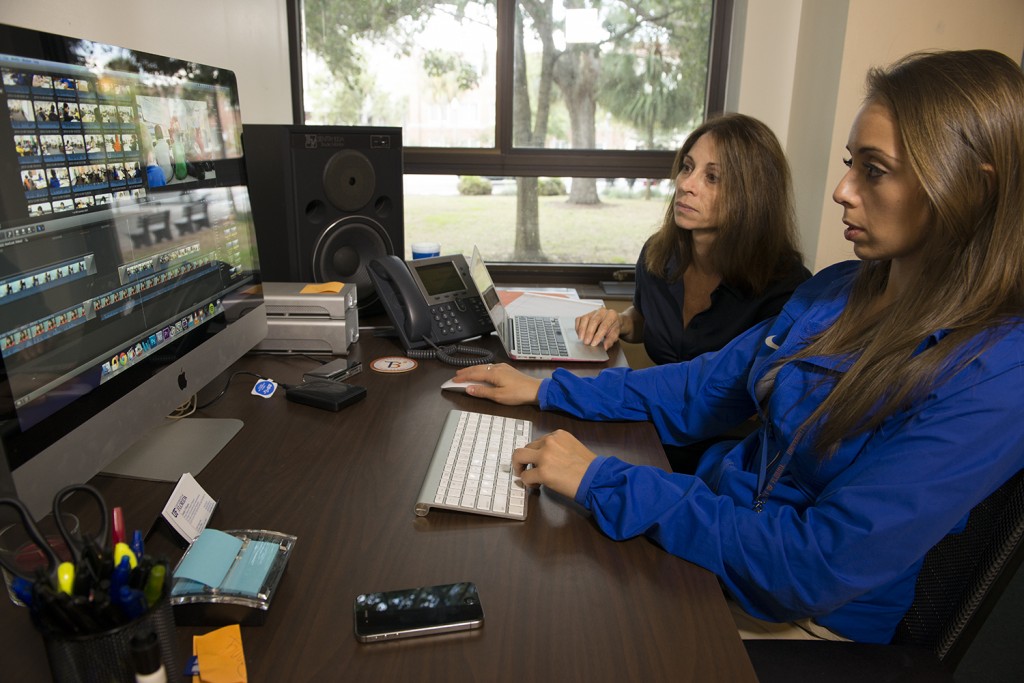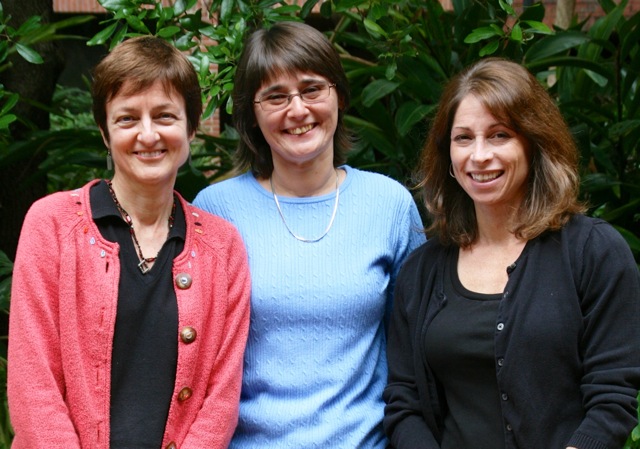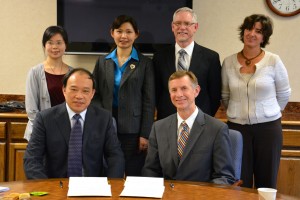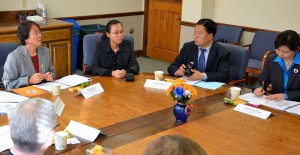7-year study aims to boost teaching of state’s English language learners
After $1 million, six years, and data from more than 24,000 elementary school teachers and 72,000 students, three University of Florida education researchers are close to completing a project that could transform the way teachers-in-training prepare to teach Florida schoolchildren whose primary language is not English.

Bilingual education professor Maria Coady (left) and UF video production specialist Emily O’Hearn edit case study videos for the new ESOL-infused curriculum that was developed as a result of Project DELTA’s findings. (Photos courtesy of UF College of Journalism and Communications)
In 2007, the U.S. Department of Education awarded almost $1.2 million to UF bilingual education professors Maria Coady, Ester de Jong and Candace Harper for Project DELTA, which stands for Developing English Language and Literacy through Teacher Achievement. Since then, the researchers have been assessing the effects that graduates from UF’s elementary teacher preparation program, called ProTeach, are having on their second language learners.
Now, they are using their findings to ensure that Florida’s future teachers are adequately prepared to teach the state’s growing population of ESOL (English to speakers of other languages) students. The study will run through June 2014.
The researchers will travel to Washington, D.C. to present their research Jan. 29 to the U.S. Department of Education’s Office of English Language Acquisition, which funded the project.
The researchers are comparing the academic performance of elementary school second-language students taught by College of Education graduates with that of ESOL students taught by non-UF teachers. By analyzing these numbers, as well as data from surveys and participating teacher-graduates, the team discovered that teachers prepared through ProTeach have a positive effect on the reading and mathematics achievement of the English language learners in their mainstream classrooms.
The College of Education’s elementary teacher prep program lasts five years, and its graduates earn a bachelor’s and master’s degree plus an ESOL endorsement by the state of Florida. The ProTeach curriculum infuses second language learning and teaching theory into their general education classes such as reading and science instruction.
“Florida has had the requirement for ESOL endorsement for initial teacher preparation in place since 2001, yet there is little research on what ESOL infusion is or what impact it has on learning,” said de Jong, the project’s principal investigator “Our study aims to fill this gap.”

The Project DELTA team is composed of (from left to right) Candace Harper, Ester de Jong and Maria Coady, bilingual education professors at UF’s College of Education.
Despite the positive implications of the data, the surveys and case studies revealed that, although UF graduates feel confident about using visuals for their second-language students and ensuring that all students feel comfortable in the classroom, they are still wary of teaching language-specific instruction, which involves explicit lessons on grammar and other fundamental language principles.
“Most of our students are monolingual and many haven’t had the experience of learning a second language beyond their high school foreign language classes, so showing them how language plays a role in the classroom can be challenging,” de Jong said.
With this new information, the research team seeks to transform the College of Education’s ESOL curriculum so elementary teacher-candidates will have more in-class opportunities to practice second language teaching strategies.
The revised curriculum also shows education students how teaching materials in mainstream subject areas can be modified for English learners. According to de Jong, the traditional curriculum focused more on ESOL-specific materials, but this new change will help teachers-in-training “think about taking the mainstream content they will be teaching and making adaptations accordingly.”
“Because they are mainstream teachers, they have to contend with mainstream materials, but through this ESOL infusion model, we give them real tools to be critical of those materials and make sound decisions for second language learners,” de Jong said.

As part of Project Delta, the researchers produced a video featuring Kim Cook pictured on computer monitor), who was selected as a model teacher for the ESOL case study videos.
Co-researcher Maria Coady is producing two case study videos for the new curriculum. The videos feature UF alumnae Kim Cook and Sasha Abreu as model teachers, chosen for their “exemplary teaching of English language learning students,” Coady said. The videos showcase examples of grouping strategies, literacy instruction, ESOL strategies, communication with parents of English learners, and the use of multicultural literature in mainstream elementary classrooms.
De Jong said they plan on showing the videos to UF elementary education students and also offering them online as instructional resources.
“We hope these videos and the accompanying guide will be useful for teacher-educators across the state and nation,” Coady said. “We also believe they are useful products to guide state and national policies on teacher education and English language teaching and learning.”
In the project’s final year, the researchers are poised to test and evaluate their ESOL infusion model within UF’s elementary education program by observing and tracking the influence of the experimental curriculum on teacher effectiveness and student achievement and acquiring feedback from the course instructors.
“Improving teacher preparation for English language learners is important, as the number of bilingual students who are placed in mainstream classrooms continues to increase,” de Jong said. “Developments such as Common Core Standards make it even more imperative that teachers understand their ESOL students and develop the knowledge and skills to ensure equal access to a high-quality curriculum for these students.”
CONTACTS
SOURCE: Ester de Jong, associate professor of bilingual education, edejong@coe.ufl.edu, 352-273-4227
WRITER: Alexa Lopez, news and communications office, UF College of Education
MEDIA CONTACT: Larry Lansford, director, news and communications office, UF College of Education, llansford@coe.ufl.edu; 352-273-4137






